1. “In my younger and more vulnerable years,” Nick Carraway from The Great Gatsby starts. The first part of the book revolves around the question, who is Gatsby? But what I always wondered was, who exactly is Nick Carraway?

2. As to the question of Gatsby, I find it interesting that there are so many similarities between Jay Gatsby from The Great Gatsby and Don Draper from Mad Men. Both went to war as poor men without any real place in the world. Both came up with different identities to hide their past. Both fell in love with beautiful women. The main difference was Don got the woman he chased after and became miserable. Gatsby died for a love that didn’t love him all that much and became a symbol of the Lost Generations of the 1920s.

3. F. Scott Fitzgerald also worked at an ad agency during the early part of his career. What would a Mad Men episode written by Fitzgerald have been like?
4. Fitzgerald wrote The Great Gatsby after the failure of his play, The Vegetable. He was deeply in debt and an alcoholic. He hoped Gatsby would become a success. It received mixed reviews and undersold at 20,000 copies when he had hoped for at least 75,000. In modern film terms, it was a box office disappointment. Some critics have suggested a novel about affluence in a time of economic depression would have been less than palatable for readers. By the time Fitzgerald died, The Great Gatsby had sold a total of 25,000 copies. He died believing he was a failure.
5. Bahz Lurhmann’s The Great Gatsby exceeded sales expectations at the box office, bringing in $51.1 million dollars starring millionaires acting as millionaires.

6. The character of Daisy Buchanan was partly based on wealthy socialite Ginevra King. Their romance was passionate but never went anywhere. Fitzgerald wrote down something a friend said as explanation: “Poor boys shouldn’t think of marrying rich girls.”

7. Fitzgerald’s wife Zelda was the other big influence on Daisy’s character (as well as most of the women in Fitzgerald’s stories). Similar to Daisy, Zelda broke their first engagement because she didn’t feel he could support her financially. After the success of Fitzgerald’s first novel, he convinced Zelda to marry him. Later, she had an affair with a French aviator. The exact nature of the affair and the extent of it has been described as ‘ambiguous,’ though it drove him crazy
8. For most gamers, Fitzgerald’s biggest influence is an indirect one. Famous Nintendo game developer, Shigeru Miyamoto, got the name for The Legend of Zelda from Zelda Fitzgerald because he liked the sound of the name so much.
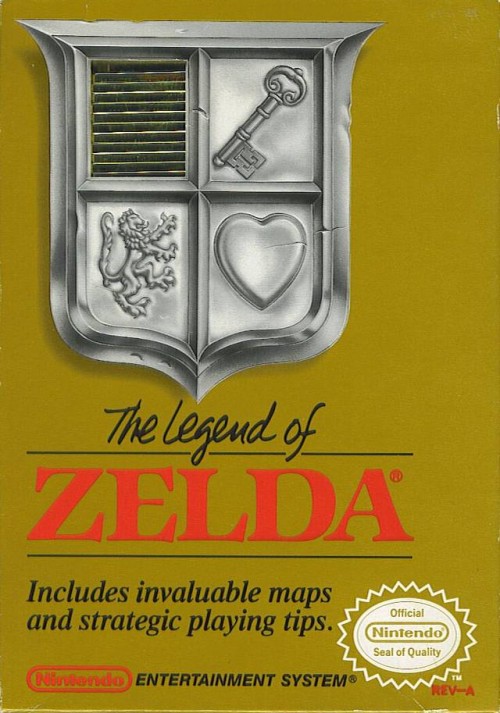
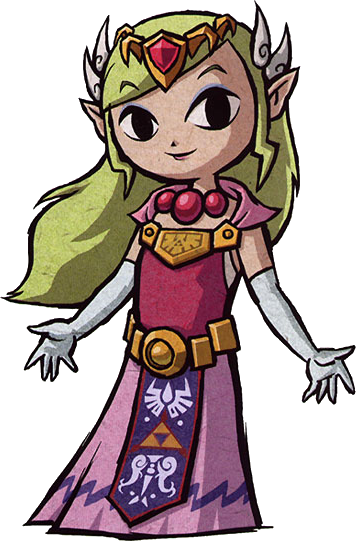
9. Charlie Hoey and Pete Smith decided to make an 8-bit homage to the classic novel and created an online game where Nick Carraway is tasked with finding Jay Gatsby.
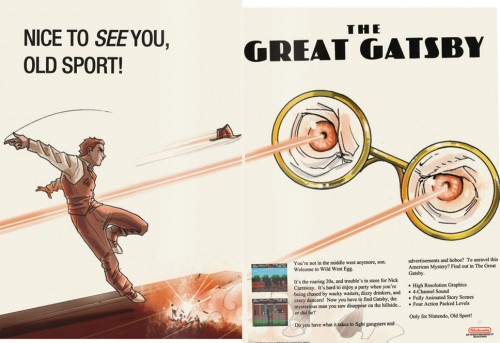
10. “Wacky waiters, dizzy drinkers, and crazy dancers,” bar your path through four levels. The cutscenes look great and one of the more memorable bosses is the huge pair of eyes from the Francis Cugat book cover (and the Dr. T.J. Eckleberg billboard) that attacks Nick aboard a moving train.
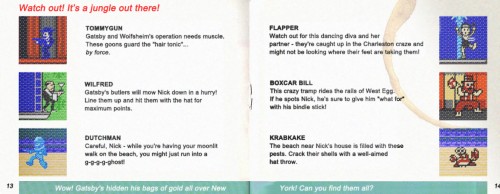
11. You romp through New York City, warding off flappers who are being a little too friendly while dodging Tommy gun wielding gangsters. Eventually, you plunge into the sewers and fight off the chomping alligators.
12. Similar to the plot of the book, Daisy crashes her car into Myrtle and kills her. Gatsby takes the blame and is shot by Myrtle’s husband. Unlike most games, you can’t rescue Gatsby as he is killed by the pool, wondering what the hell he’s done with his life. There is no final boss.


13. I still don’t get why Gatsby, who could have had any woman in the world, chased after Daisy to the point of bringing about his own destruction. When circumstances looked less rosy with Gatsby, she went back to her husband Tom, despite the fact that Gatsby had fought so hard and sacrificed so much for a life with her. At the least, she could have attended his funeral. For those who say Daisy represents the American Dream, the question takes on a more disturbing implication.
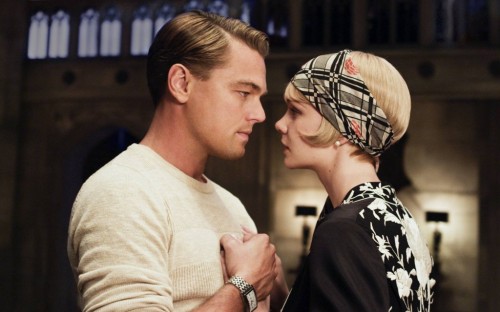
14. In a moment more dramatic than the book, the mansion collapses at the end of the game like Castlevania falling apart in the horizon. A full credit section awaits. “They were careless people, Tom and Daisy” and Dracula “— they smashed up things and creatures and then retreated back into their money or their vast carelessness or whatever it was that kept them together, and let other people clean up the mess they had made.”

15. You can play the game on most computers here. It takes about ten minutes to finish and is not hard, though the final level offers some challenges with the ghost soldiers.
16. F. Scott Fitzgerald didn’t like the title of The Great Gatsby and wanted to call it several other names. The High-Bouncing Lover, Trimalchio in West Egg, and Gold-Hatted Gatsby were three. Would The Great Gatsby have become as popular as it did if it had been called Trimalchio in West Egg or The High-Bouncing Lover?
17. Actor Andy Kaufman used to read The Great Gatsby to university students who’d heckle him as they expected him to reenact some of his more iconic characters. Andy Kaufman would not have made a great choice to play Gatsby.

18. Leonardo DiCaprio was an inspired choice: “If personality is an unbroken series of successful gestures, then there was something gorgeous about him, some heightened sensitivity to the promises of life, as if he were related to one of those intricate machines that register earthquakes ten thousand miles away.” King of the world anyone?

19. I may lose you here. I was expecting a lot more spectacle and insanity from a Gatsby movie done by Baz Lurhmann. With how bad the reviews were, I was also expecting a train wreck. I was surprised, then, to find it a pretty faithful adaptation of the book with solid performances from all the leads that I enjoyed. Leonardo DiCaprio was incredible as Gatsby, projecting an image of wealth until faced with the prospect of meeting Daisy for the first time when he chokes up like a nervous school boy.
20. From Moulin Rouge to Gatsby, Baz Luhrmann knows how to make a party look fun. Again, as another surprise, while the first quarter of the film is full of parties, the last half or so focuses on the relationships between Gatsby, Daisy, Tom, and Carraway. There is a scene where Gatsby is curious if Carraway will help him with a favor to invite Daisy over. When Nick agrees, Gatsby, feeling indebted, offers him financial favors back. Nick graciously refuses, but you get a sense of the kind of life Gatsby lived; struggling for every cent, not used to favors from anyone— the opposite of Tom Buchanan. Scenes like this have a texture that the more bombastic Moulin Rouge and even Australia rarely rely on and I appreciated that fact.
21. Many of the reviews of The Great Gatsby from Fitzgerald’s contemporaries were harsh.”In form no more than a glorified anecdote, and not too probably at that.” Another paper wrote that they were “quite convinced after reading The Great Gatsby that Mr. Fitzgerald is not one of the great American writers of today.” The reviews match the tone of the film reviews. For example: “There are no two ways about it: The Great Gatsby is misconceived and misjudged, a crude burlesque on what’s probably American literature’s most precious jewel.”
22. Probably my favorite representation of F. Scott Fitzgerald on screen is in Woody Allen’s Midnight in Paris that stars Tom Hiddleston as a charming and lively Fitzgerald. Woody Allen’s ex-wife, Mia Farrow, played Daisy in an earlier film adaptation of The Great Gatsby, though I have not seen that version.

23. Midnight in Paris is a lot about the identity of an artist struggling to find him/herself. I loved the way the movie brought Ernest Hemingway’s Moveable Feast to life. After reading The Great Gatsby for the first time, Hemingway had this to say: “When I had finished the book I knew that no matter what Scott did, nor how he behaved, I must know it was like a sickness and be of any help I could to himself and try to be a good friend… If he could write a book as fine as The Great Gatsby I was sure that he could write an even better one. I did not know Zelda yet and so I did not know the terrible odds that were against him.”
24. The book presaged the ending of an era, symbolized by Carraway turning 30. “Before me stretched the portentous menacing road of a new decade,” the jazz age of the 1920s seeping into the Great Depression of the 1930s.

25. I finally figured out who Nick Carraway is. He is Spider-Man.
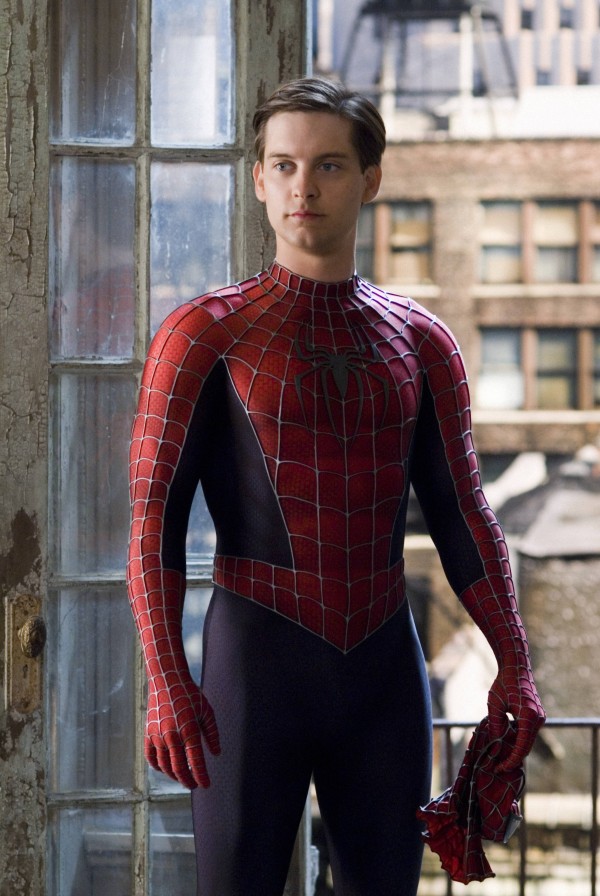
Tags: 25 Points, Baz Luhrmann, F. Scott Fitzgerald, The Great Gatsby

[…] http://htmlgiant.com/reviews/25-points-the-great-gatsby-novel-game-and-movie/ […]
Mia Farrow was never married to Woody Allen.
And you have nothing to say about the novel’s most interesting characters, Jordan Baker and Meyer Wolfsheim?
i love Jordan Baker, she’s the best
Leo is a good choice for Jay, Toby is a good choice for Nick, but Carey Mulligan, much as i like her, is simply wrong as Daisy; she is much too chunky; Mia was a perfect Daisy cast
who doesn’t love love love TPD’I’s epigraph?!!!!!!!!!!!!
hey Richard, thanks for that! And I agree that Jordan and Meyer are very interesting characters. For this 25 points, I wanted to discuss the intersection of the 3 different mediums for The Great Gatsby rather than a review of the book, and as Jordan and Meyer were minor characters in the film and totally absent in the game, I left them out and focused on the 3 in all 3 mediums. That is Gatsby, Carraway, and Daisy.
Agreed, that epigraph is great =)
1. Nick Carriedaway is the person who thinks Gatsby is “great” — not impressively wealthy or charming or useful, but great. It’s Nick whom the title discloses, in the way that his descriptions of Gatsby disclose a relation rather than an object.
13.
Not that Gatsby loves money, or her money, or her for her money. He has money, he knows how to get more, he’s not afraid to get as much as he wants to spend. Gatsby’s a gangster, a hard man — Nick realizes that Gatsby as much as is a killer. That’s why Tom ‘fights’ Gatsby: Gatsby’s a threat, in Tom’s little cage.
I think what Gatsby loves in Daisy is effortless efficacy, the power not of a fist or gun, but of glamour — of causing in others the will to be seduced.
13 (2.). I don’t think Daisy throws Gatsby over because “circumstances looked less rosy” with him, or because she “didn’t love him that much”. Fitzgerald is fair to Daisy: Gatsby does ask for “too much”. He wants his remaking of the world to envelop her past, and she’s just not crazy enough for that–she demands a kind of practicality-after-all. Or maybe: she’s not crazily in love in that way; she loves him enough, but it’s got to be a pragmatic romance, as it were. The compromise of remaining with Tom–whom she plainly loathes–is just less threatening to her than what, to her, looks like playing make-believe for real.
16. Trimalchio in West Egg is an excellent title — a subtly revealing plane of intersection of the story. But it would’ve been a big mistake, sending readers with their maps Eliot-style to Petronius to find the skeleton key. Fitzgerald was simply uncharacteristically wrong about The Great Gatsby as a title.
23.That’s a killer Hemingway remark — razor-mean and uncomfortably accurate-sounding. But that’s Hem.
25. To me (and, probably, many), the thing about Nick is the thing about Ishmael and Huck: the protagonist of the story is not the hero of the story. It’s a neat trick, and maybe one that lends itself to ‘America’: the story of the story is that the person telling you the story is telling you the story of her or his moral decision about or through another person’s ‘heroism’.
[…] comments on articles and stories that you’ve written. I’ve actually been waiting for my The Great Gatsby review at HTMLGiant to go up before posting this and I’m glad I did as I wanted to incorporate Fitzgerald into my […]
Awesome deadgod. In regards to #13, I agree that Gatsby is in love with more of an illusion which Nick recognizes as what you call the “effortless efficacy,” particularly as she starts crying about the shirts, ha ha. And while Gatsby does ask for too much and Daisy vacillates, both their hands get forced by the accident. I get the practical aspect of Daisy’s choice. What surprised me the first time I read the Gatsby was how coldly practical she becomes, not even showing up at the funeral. I mean, in essence, he died covering up for her. In summarizing, I know “less than rosy” really simplifies it, but it was also a play of words on how Daisy loves the “roses” aspect of the romance. When everything is beautiful, she’s around. When it’s not, she discards him. Which goes back to how Fitzgerald viewed life, particularly as he saw through the superficiality of the Jazz Age. Much of his life is about wanting to be part of something and being on the outside looking in (his failures with the play and even with Daisy’s initial rejection of him didn’t help). In that sense, Carraway is a mask, as is Gatsby, for Fitzgerald (and hence my play on Spider Man) at the end.